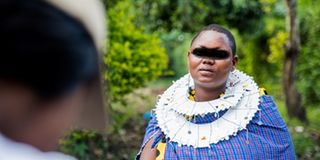Every one effort's counts in the fight against FGM

What you need to know:
There's power behind heroic feats being led by different individuals in the fight against FGM.
Throughout their journeys, the young activists and influencers discovered that individuals have had a great impact in the communities they serve.
Driven by passion sometimes these individuals would face hostile predicaments from the same communities they try to protect.
We have read in the last episodes, of some of the heroic feats being led by different individuals in the regions visited by our five influencers.
From the couple in Singida who decided to use their experience to teach other people on the effects of FGM, to FGM survivors, former ngaribas (women performing FGM/cutters) and traditional elders who, in one way or another, have made personal initiatives to expel FGM practices from their communities.
In this episode we will highlight two individuals who go that extra mile as part of their daily lives in ensuring a Tanzania free from female genital mutilation (FGM).
During the discussion between Diana Lukumay, the young activists advocating against FGM, and Namaiyani, who is an ex-cutter from Arusha region, it became apparent that fight against FGM is tough and requires constant and courageous initiatives:
“They label us crazy and misleading, because of advocating against FGM. We try our best to reach as many girls as possible but our resources are limited. For instance, I have a family to take care of and I have a husband. Men don’t like us to advocate against FGM. At times I have to walk more than 20km or 30km to raise awareness about the effects of FGM.
There are children who do not go to school. I’m glad with the recent efforts from the government more children are going to school, but some parents still keep their children from going to school. For instance, I know three girls that could only start primary school at 15 years of age because their fathers had betrothed them and received their bride price.
I made personal efforts to talk to their mothers and find ways to enroll them in school because that was the only way to keep them from being married off. One of them said she was scared of her husband’s reaction so I went to speak to the school teachers. We planned that the mother would take the girl to the village clinic and the teacher would come to the clinic and order the mother to enroll the girl in school. Then, the mother would go home crying and saying that the teachers had forced their daughter to go to school and there was nothing she could do about it. At least that way she would not get in trouble with the husband and the girl would go to school. There are so many more girls in the villages who are not enrolled in school.
I have seen a lot of pain that women go through. We need to emancipate women and girls. They are the future. We need to do more in rural areas.”
Further north in Mara region, more than 2,500 girls have been rescued by the ATFGM Masanga Centre between 2008 and 2017, while another 400+ were rescued from FGM in 2018.
Valerian is a young programme officer working at Masanga Centre. Valerian spoke to Rebeca Gyumi, the activist who visited Mara region, on his experiences addressing FGM in the area:
“There is one incident that will never be erased from my mind. It concerns a girl who was about to be sacrificed because she had become pregnant before undergoing FGM. Her father had passed away around the same time she was pregnant. Two weeks after he was buried and the elders had come to conclude the funeral rites, they said that the father had died because the daughter had gotten pregnant out of wedlock and was not excised. They said she was a curse in the family. They planned to sacrifice her in a forest in Serengeti.
I was informed of this incident and asked for the office car. I went to ask for the support from the police and together we followed up on this. We found them in the forest about to sacrifice the girl who was unconscious at the time. We took her to the hospital and when she became conscious she told us all that had transpired. Unfortunately, we never found the elder who had initiated the ritual to sacrifice the girl, and even her mother had disappeared.
There are so many incidences where I have risked my life but I believe it was all worth it because I cannot stand to see a child harmed in any way. I believe the most important thing is to change the mindset of the people through education and capacity building.
I remember after I graduated and I decided to come to Mara from Dar es Salaam how my friends and peers discouraged me. They did not think it was a good idea to come and address issues that were enrooted in people’s culture for hundreds of years. But I was not discouraged and I do not regret coming here,” concluded Valerian.
Namaiyani and Valerian are individuals who represent diverse demographics, but they have one main thing in common: they both want a community free from FGM, free from all forms of gender based violence. In their everyday lives, they live to make a difference.


